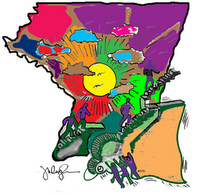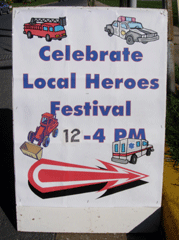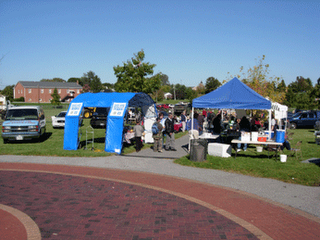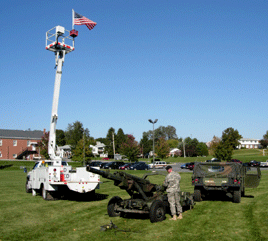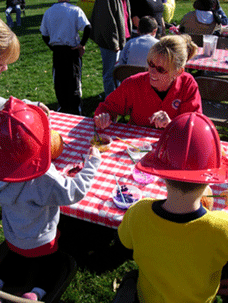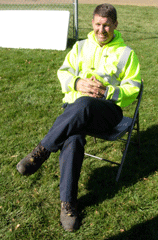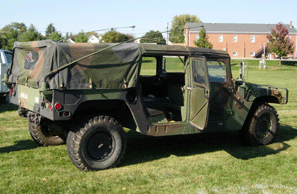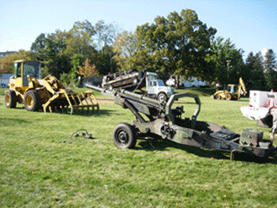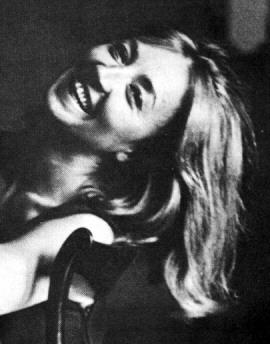
Anna Politkovskaya killed October 7, 2006
Anna Politkovskaya murdered in Moscow
http://www.moredevastation.com/actualite/2006/10/7/anna-politkovskaya-murdered-in-moscow.html
Special reports
Chechnya
Russia
Interactive guides
Russia's offensive in Chechnya
1994-96 war
From the Guardian archive
31.08.1996: 31.08.1996: Chechen war is over, says triumphant Lebed
18.12.1994: 18.12.1994: Yeltsin begins to lose war of words over Chechnya
12.12.1994: 12.12.1994: Russian forces steamroll into breakaway republic
World news guide
Russia
Media
Chechen foreign ministry
Chechenpress state information agency
Chechen Times
Moscow Times
Gazeta.ru
Russia Journal
Interfax news agency
Putin's Russia by Anna Politkovskaya is published by Harvill. To order a copy for £8.99 with free UK p&p, call the Guardian Book Service on 0870 836 0875, or go to www.guardian.co.uk/bookshop.
The murder of the Russian journalist Anna Politkovskaya is an irremediably great tragedy. The conflicting rights Anna Politkovskaya, r.i.p. and perspectives involved in the Chechen situation notwithstanding, Russia is now so much less than she has been
_____
Dispatches from a savage war
http://www.guardian.co.uk/women/story/0,,1327791,00.html
Poison and death threats won't stop Anna Politkovskaya from reporting the truth about Chechnya. She talks to James Meek
Friday October 15, 2004
The Guardian
Anna Politkovskaya was born into Soviet high society; the kind of privileged, metropolitan elite that knew abroad better than it knew the factories of the Urals, and whose children were guaranteed comfortable jobs in the rambling bureaucracies of Moscow.
Half a life later, in her 40s and a mother of two children, Politkovskaya found herself alone at night in the Chechen hills, fleeing through the darkness. She was running from the Russian security service, the FSB, which wanted to arrest her, but out there in the highlands of a lawless region steeped in bloodshed, she could have fallen victim to anyone or anything; Chechen bandits, Russian or Chechen government death squads, a broken neck. It was Europe, in 2002.
"I walked the whole night," she says. "I wanted to stay alive! It was terrifying. I reached the [Chechen] village of Stary Atagi at dawn. I stayed there for a day and a night, keeping my head down ..." She talks about it for a while, then seems to check herself, feeling perhaps that telling a stranger about one of the numerous occasions in her career as a journalist that she faced a threat of imprisonment or serious harm is irrelevant to the serious business of reporting. "These are just details," she says, finally.
In the bland setting of a publisher's London flat, you can see in Politkovskaya, one of the bravest of Russia's many brave journalists, the different ages of her life, and her looking serious in each of them: the bookish student of the 1970s, the earnest, curious young Soviet reporter, the journalist who embraced the freedoms of perestroika in the late 1980s, the veteran of Russia's recent conflicts who returns time and again to Chechnya to enrage the Kremlin leadership as it seeks to make of Vladimir Putin an infallible khan.
Her seriousness is not just her frown, her severe glasses and full head of grey hair. It's the tension, anger and impatience in her whole body, making clear that her sense of the continual injustice being perpetrated in her homeland never leaves her, that she can't shut it out in a way almost all British journalists, even the campaigning, radical kind, can.
It's a surprise, then, to see her start to laugh and make fun of the Guardian's photographer when he gets her to pose for him. "Photographers always do that," she says, in her hesitant English. "They get people to do things they don't normally do." The photographer gets quite annoyed and you realise that Politkovskaya is still young (she's 46). And still hopeful. The author picture on the back of her new book, Putin's Russia, is so self-consciously tragic, and its subject matter so bleak, that I ask her whether she thinks it might take generations for her country to become truly free.
"I wouldn't ever want to say it would take generations," she says. "I want to be able to live the life of a human being, where every individual is respected, in my lifetime."
Politkovskaya was born in New York, where her Soviet Ukrainian parents were UN diplomats, in 1958, five years after the death of Stalin. She was sent back home to be educated and after school entered one of the most prestigious university departments in the USSR, the journalism faculty of Moscow State University. Among its other advantages, her parents' diplomatic status enabled them to smuggle banned books into the country for her, and she was able to write her dissertation about a normally forbidden poet, the emigre Marina Tsvetayeva.
After graduation, Politkovskaya worked for the daily Izvestiya, then moved to the in-house paper of the state airline monopoly Aeroflot. "Every journalist got a free ticket all year round; you could go on any plane and fly wherever you wanted. Thanks to this I saw the whole of our huge country. I was a girl from a diplomatic family, a reader, a bit of a swot; I didn't know life at all."
With the coming of perestroika, Politkovskaya switched to the independent press which began to emerge and flourish: first Obshchaya Gazeta, then Novaya Gazeta (New Newspaper). None of the terrible things that have happened in Russia since the coming to power of the reformer Mikhail Gorbachev in 1985 have persuaded Politkovskaya that it would have been better to preserve the USSR.
"From an economic point of view, life became very difficult," she says, "but politically it wasn't shocking at all. It was simple happiness, that you could read and think and write whatever you wanted. It was a joy. You need to endure a great deal in the way of economic hardship for the sake of freedom."
Hardly had the new countries of the former Soviet Union begun to stand on their feet, however, than a series of internal wars broke out. The most savage of them, continuing to this day, involves various attempts by Russian government troops to regain control over the small region of Chechnya. Politkovskaya became one of the most dogged reporters of that conflict.
Russians speak of two Chechen wars: the first, under Yeltsin, from 1994 to 1996, ended with a peace deal and troop withdrawal under pressure from the media and public. When Putin invaded for a second time, in 1999, he took steps to ensure that the media would not embarrass him with reports about the reality of Russia's brutality in Chechnya. If, as Politkovskaya believes, stopping the first Chechen war was the Russian media's greatest achievement in the relatively free Yeltsin years, the second Chechen war has been its greatest disaster. Once an independent voice among many, Novaya Gazeta is now among the few Russian media outlets which have not yet been intimidated into toeing the Kremlin line.
The second Chechen war began by costing Politkovskaya her marriage. She returned home to Moscow one day in 1999, fresh from reporting on a long-range Russian rocket attack in Grozny which had hit a market and a maternity hospital, killing scores of people, including women and children, to hear her husband tell her: "I can't take this any more." Recently, it almost cost her her life, when, on her way to Beslan in the early hours of the school hostage crisis, she was slipped poison in a cup of tea. In between, she has experienced countless death threats from Russian troops, Chechen fighters and the other, more shadowy armed groups operating in the margins of the war. The kidnappings, extrajudicial killings, disappearances, rapes and tortures she has reported on in Chechnya have left her convinced that Putin's policies are engendering the terrorists they are supposed to eliminate.
"To this day there's torture in any FSB branch in Chechnya, like the so-called 'telephone', where they pass an electric current through a person's body. I've seen hundreds of people who've been through this torture. Some have been tortured in such an intricate way that it's hard for me to believe that it was done by people who went to the same sort of schools that I did, who read the same textbooks."
Politkovskaya has no regrets about the times she has stepped outside the role of reporter in recent Chechen terrorist attacks - as a negotiator in the Moscow theatre siege, and as a would-be negotiator at Beslan, before she was poisoned. "Yes, I went beyond my journalistic role," she says. "But it would be quite wrong to say that doing so was a bad move from a journalistic point of view. By setting aside my role as journalist I learned so much that I would never have found out being just a plain journalist, who stands in the crowd along with everyone else."
She has harsh words for what she sees as the west's kid-glove treatment of Putin and Russia. "Most of the time they forget the word Chechnya. They only remember it when there's a terrorist act. And then it's, 'Oh!' And they start their full coverage up again. But virtually nobody reports on what is really going on in that zone, in Chechnya, and the growth of terrorism. The truth is that the methods employed in Putin's anti-terrorist operation are generating a wave of terrorism the like of which we have never experienced."
The Bush-Blair "war on terror" has been of enormous help to Putin, Politkovskaya says. Many people in Russia gained perverse comfort from the pictures of US abuses in Abu Ghraib prison. "I've heard it many times. In Russia you hear people talking about it with pride: that, 'We treated the blacks like this before the Americans did, and we were right, because they are international terrorists.'
"Putin's begun to try to prove on the world stage that he's also fighting international terrorists, that he's just a part of this fashionable war. And he's been successful. He was Blair's best friend for a while. When, after Beslan, he began to state that we were seeing virtually the hand of Bin Laden, it was appalling. What's Bin Laden got to do with it? The Russian government created these beasts, brought them up, and they came to Beslan and behaved like beasts."
The only way for the west to regain moral authority, Politkovskaya argues, would be for it to treat Putin as it treats Alexander Lukashenko, the autocratic, bullying president of Russia's neighbour Belarus - not sanctions, but a more personal, tailored form of ostracism. "It's impossible to talk on the one hand about the monstrous scale of victims in Chechnya and the spawning of terrorism and then lay out the red carpet, embrace Putin and tell him: 'We're with you, you're the best.' That shouldn't be happening. I understand, our country's a big market, it's very attractive. I understand it very well. But we're not second-class people, we're people like you, and we want to live."
20041015 Russian journalist Anna Politkovskaya
20061007 Anna Politkovskaya killed
20061017 SDOSM
Journalists Politkovskaya-Anna



